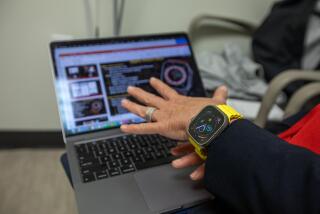Medical Data Called Crucial in Emergencies : Plastic Wallet Card Can Be a Life Saver
- Share via
SAN FRANCISCO — An epileptic is sent to the drunk tank. A diabetic collapses before her condition is diagnosed. An accident victim lies unconscious as paramedics scramble to get medical data vital to his treatment.
A wallet-sized card tucked in the billfold could prevent such scenes and prove a key to survival.
Laminated in plastic, the Emergicard contains essential medical and personal information on a piece of microfilm. By folding the card in half, those first at the site of an emergency can read the detailed data instantly through a powerful magnifying lens embedded in the card.
Plenty of Examples
“The card can save your life,” said Patrick White, an 18-year veteran of the San Francisco Fire Department abounding in examples to back up his claim.
Of 43,000 responses by the city’s firefighters last year, 13,000 involved emergency medical problems, he said. In many cases, rescue efforts were hampered by the victim’s delirium, unconsciousness, hysteria or inability to speak English.
“The Emergicard--as full of medical records as a fat file--can save critical minutes and mistakes,” White said. “There have been cases of epileptic and diabetic seizures and convulsions being mistaken for drunkenness, and some patients have wound up in the drunk tank.”
An especially close call came last year.
White and two co-workers rushed to a 12-unit Victorian apartment building in response to a plea for medical assistance.
Woman in Convulsions
“A group of excited neighborhood kids led us to a second-floor flat where we found a woman in bed, pale, perspiring, groggy, in convulsions. She was too sick to talk and didn’t speak English anyway,” White recalled.
“Two of us were administering oxygen, while the third guy was turning the place inside out for a clue to her rapidly deteriorating condition.”
Just as a call on the radio informed the desperate men the ambulance would be delayed, the woman’s brother rushed up the stairs, screaming, “diabetico!”
“When we realized she was a diabetic suffering from a sugar imbalance, the critical situation became easily remedied,” White said. “We made her sip some orange juice, and a few seconds later, the convulsions stopped.”
Normally, a convulsive person would never be given food or liquid, for fear of choking.
“If her brother had not come in, the woman could have gone into insulin shock with the possibility of brain damage or even death,” White said.
Alerts for Medics
Owners of Emergicards place stickers in wallets, homes and cars, alerting medics to the emergency medical information.
The microfilm includes such vital data as blood type, current medications, known medical problems such as epilepsy, diabetes, hypertension, heart troubles, emphysema, cancer, hemophilia, allergies and asthma.
The card also lists home and business telephone numbers and addresses, persons to be contacted, preferred hospital and physician, medical insurance company and legal consent to treatment.
The American Medical Assn. and Easter Seal Society of San Francisco, which will receive part of the proceeds from sale of the card, have endorsed the Emergicard for everyone.
The first card in a household costs $11.20 in California and $10.60 elsewhere. Other family members pay $6.95 apiece.
More to Read
Sign up for Essential California
The most important California stories and recommendations in your inbox every morning.
You may occasionally receive promotional content from the Los Angeles Times.












